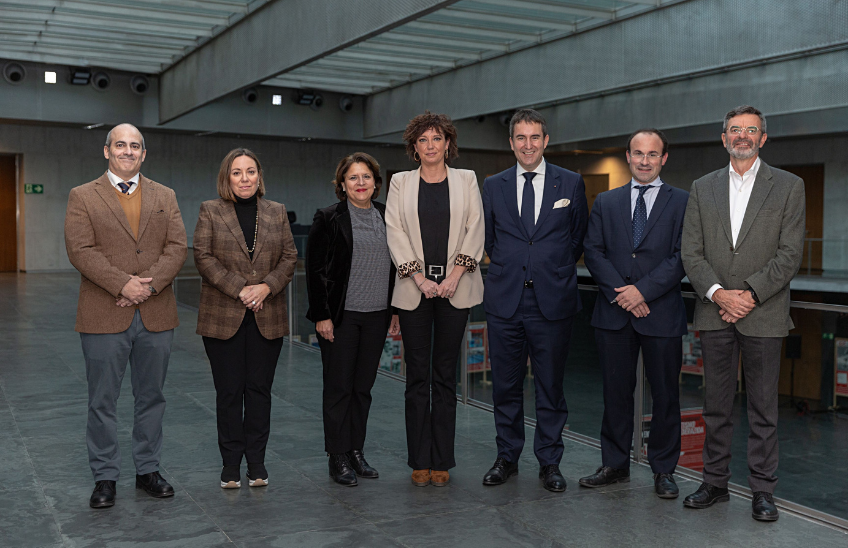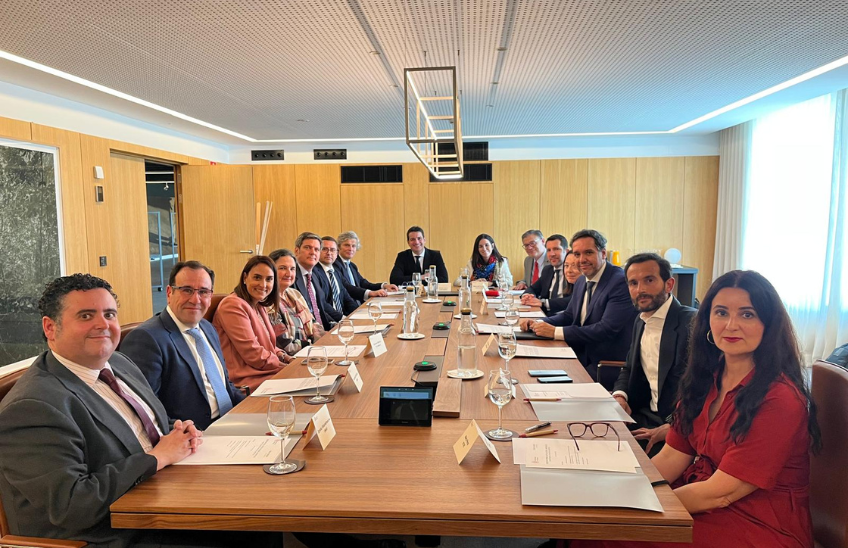The University and the Parliament address current armed conflicts from the perspective of international law and refugee protection at workshop
The activity is part of the activities of the classroom of Parliamentary Law, promoted by the School of Law and the Chamber of Deputies.

PhotoManuelCastells/From left to right, Mario Pereira, María Teresa Gil Bazo, Asunción de la Iglesia, Ainhoa Unzu, Gonzalo Villalta, Fernando Simón and Pablo Pérez.
23 | 11 | 2023
How does international law protect refugees? What are the rules governing acts of war? What are the historical keys to understanding the status in the Middle East or what is Russia's criminal responsibility for the invasion of Ukraine? The professors of the University of Navarra, María Teresa Gil BazoMario Pereira and Pablo Pérez López provided answers to these and other questions during the roundtable Current Armed Conflicts: Analysis and Perspectivesorganized by the School of Law in partnership with the Parliament of Navarra and which is part of the activities planned for the classroom of Parliamentary Law.
Held at the headquarters of the Foral Chamber, the meeting was also attended by the Vice President of the Foral Parliament, Ainhoa Unzu; and the Director of the classroom of Parliamentary Law, Asunción de la Iglesia. Ainhoa Unzu valued these spaces for dialogue "that help to understand and analyze with perspective what is happening. To broaden our view of the barbarities we are witnessing". Asunción de la Iglesia added: "Wars highlight the world of borders and confrontation. Precisely, the purpose of these sessions is to have a more open horizon. As academics and parliamentarians, we always play a preventive role to avoid conflict through the law.
Gonzalo Villalta, Full Professor of International Public Law and director of the department of International Relations of the University, moderated the workshop and launched three ideas to contextualize the discussion, armed conflicts understood as civilizational conflicts; cooperation, which enables the resolution of problems that go beyond the sovereign autonomy of states; and interdependence, through initiatives of economic and then political integration, where freedom prevails based on the dignity and rights of the person, in a climate of respectful plurality.
The right to war and the legitimate defense of states
Professor María Teresa Gil Bazo began her intervention by speaking of the origins of the law of war, from the concept of just war defended by St. Augustine until the 20th century: in 1928 the states signed the so-called Kellogg-Briand pact, in force today and which obliges the states to condemn the use of war and renounce it as an instrument of international policy in their mutual relations. "The UN Charter prohibits the threat and use of force, but allows for self-defense against armed attack, until the UN committee has adopted collective defense measures," Gil Bazo explained. He also addressed the right to self-defense of states, highlighting the difficulties of framing the defense against acts of terrorism in the existing legal framework .
María Teresa Gil Bazo provided some figures: more than 108 million people are forcibly displaced, 41% are children and the vast majority of the total are fleeing armed conflicts. She referred to the 1951 Geneva Convention as the text that regulates refugee status and to UNRWA, the United Nations Agency for Palestine Refugees in the Near East, and highlighted recent decisions in the EU Court of Justice regarding the protection of Palestinian refugees, as well as the consideration of Afghan women as refugees.
Mario Pereira analyzed the criminal liabilities for Russia's aggression against Ukraine. "Currently, he noted, in Ukrainian courts there are 25,000 open cases." And when it came to talking about Criminal Law International he went back to the Nuremberg trials, which judged the war crimes of Nazi Germany. "Without law, there is no peace; without peace there is no prosperity. Nuremberg succeeded in holding individuals accountable for acts carried out by states that generated unprecedented human massacres. I believe that trials serve to educate and raise awareness," he said. He noted that crimes against humanity were on record in Ukraine and assured that it was clear from the beginning that Russia's goal was the territorial conquest of Ukraine. "They are saying that Ukraine belongs to them, that it is part of greater Russia, which establishes a direct thread with the war of aggression defined in the Nuremberg statute."
The division of the Arab world and Israeli disrespect
The division of the Arab world and the lack of respect and Israeli aggressiveness towards the Palestinian people are some of the keys to understanding the current conflict in the Middle East that Pablo Pérez López, Full Professor of History and director of Institute for Culture and Society of the University of Navarra, developed later. "We are facing the deepest-rooted conflict that exists today. The consciousness of identity of the Hebrew people is very old". Pablo Perez went back to the end of World War I with the dissolution of the Ottoman Empire to understand the conflict today. The great Arab nation promised to the Arab peoples by the French and the British never came into being. In parallel, in 1917, Great Britain declared its support for the creation of the Jewish national home in Palestine.
In 1947, after World War II, the UN proclaimed the state of Israel. "The Arab countries did not accept the new state, they waged war and Israel responded with increasing aggressiveness towards them," he explained. Pablo Perez reviewed the recurrent wars in the area and also the attempts at peace agreements between Arabs and Israelis with the mediation of the United States, which in several cases ended with the assassination at the hands of radical groups of prominent leaders such as the Egyptian president, Anwar el-Sadat, and the Israeli prime minister, Yitzhak Rabin. While acknowledging that the Hamas attack on Israel on October 7 will lead to years of hostilities, Pablo Perez added: "The international community must try to provide a way out for the Palestinian population. Peace cannot be built on injustice".

